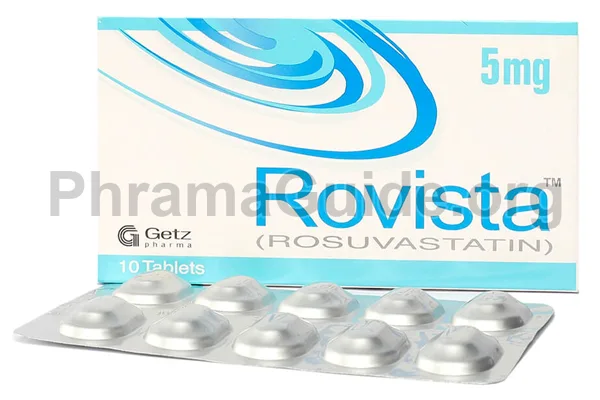Rovista tablets are used to lower cholesterol and triglyceride levels in the blood and to raise HDL (good) cholesterol levels. It is also used to reduce the risk of heart attack, stroke, and other cardiovascular events in people with high cholesterol and other risk factors for heart disease. Following are some common uses of Rovista tablets:
- Hyperlipidemia: Rovista tablet is used in individuals with high levels of cholesterol (hyperlipidemia), particularly high levels of low-density lipoprotein (LDL) cholesterol, which is often referred to as “bad” cholesterol. It also helps increase levels of high-density lipoprotein (HDL) cholesterol, which is often referred to as “good” cholesterol.
- Dyslipidemia: Rovista tablet is used to treat dyslipidemia, a condition characterized by abnormal levels of lipids (cholesterol and/or triglycerides) in the blood.
- Atherosclerosis: Rovista tablet helps to reduce the buildup of plaque in the arteries, a condition known as atherosclerosis. This can help lower the risk of heart disease and stroke.
- Coronary Artery Disease (CAD): Rovista tablet is used for individuals with known coronary artery disease to help prevent further progression and reduce the risk of cardiovascular events.
- Prevention of Cardiovascular Events: Rovista tablets may be used in individuals at high risk of cardiovascular events, such as heart attack or stroke, even if their cholesterol levels are not extremely elevated.
- Familial Hypercholesterolemia: Rovista tablets may be used in individuals with a genetic condition called familial hypercholesterolemia, which leads to very high cholesterol levels.
- Primary Prevention of Cardiovascular Disease: Rovista tablets may be used in individuals without a history of cardiovascular disease but who have certain risk factors, such as high cholesterol levels or diabetes, to prevent the development of cardiovascular events.
- Post-Stroke Prevention: In some cases, Rovista tablet may be used in individuals who have had a stroke to lower the risk of future strokes.
Off-label Uses of Rovista Tablet
- Diabetes-Related Complications
- Prevention of Dementia and Cognitive Decline
- Treatment of Non-Alcoholic Fatty Liver Disease (NAFLD)
- Treatment of Autoimmune Diseases
- Improvement of Erectile Dysfunction
- Polycystic Ovary Syndrome (PCOS)

What is Rovista?
Rovista is one of the leading brands of Rosuvastatin, manufactured and marketed by Getz Pharmaceuticals, Pakistan.
Rovista Alternatives : Other Similar Brands
The following are some available alternative brands of Rovista and their manufacturers.
- Rolip : Hilton Pharmaceuticals (Pvt) Ltd, Pakistan.
- Rosubar : Barrett Hodgson Pakistan (Pvt) Ltd.
- Rosera : Sami Pharmaceuticals (Pvt) Ltd, Pakistan.
- Rostor : Saffron Pharmaceuticals (Pvt) Ltd, Pakistan.
- Ruvastat : Abbott Laboratories (Pakistan) Ltd.
- Rosulin : Highnoon Laboratories Pakistan (Pvt) Ltd.
- Crestat : (CCL) Consolidated Chemical Laboratories (Pvt) Ltd, Pakistan.
- Fourtius : High-Q Pharmaceuticals (Pvt) Ltd, Pakistan.
- Kestor : Scilife Pharmaceuticals (Pvt) Ltd, Pakistan.
- Rosuvax : Asian Continental Pharma (Pvt) Ltd, Pakistan.
- Rast : Tabros Pharma, Pakistan.
Rovista : Available Formulations and Strengths
Presently, Rovista is available in tablets form
Rovista Tablets : 5mg, 10mg, and 20mg strengths
Who Should Not Use Rovista?
Rovista is an effective and safe treatment for many people. However, as with any medication, there are potential contraindications that patients should be aware of before beginning therapy.
The first potential contraindication to consider is allergies or hypersensitivity reactions. Rovista contains inactive ingredients that may cause allergic reactions in some individuals.
Another important potential risk factor for Rovista is liver disease or dysfunction. Patients with pre-existing liver conditions may be at an increased risk of developing serious adverse effects when using Rovista.
People who consume large amounts of alcohol on a regular basis may also need special consideration when using Rovista due to its potential effects on the liver.
Pregnant women and nursing mothers should not use Rovista due to its unknown effect on fetal development or a baby’s health after birth.
If anyone who suffers from kidney disease or dysfunction should also exercise caution when considering using Rovista, as kidney problems can contribute to additional complications during treatment.
What is the Recommended Daily Dosage of Rovista?
Rovista Dose for Adults:
- One tablet of 5mg or 10mg once daily.
- The maximum recommended dose is Two tablets of 20mg (40 mg) once daily.
However, the higher dose (40mg/day) is usually recommended for individuals with severe hypercholesterolemia or individuals at high risk of cardiovascular events who have not achieved their target cholesterol levels with lower doses.
How Rovista Works?
Rovista works by slowing cholesterol synthesis to decrease its amount in the body. Rovista inhibits the HMG-CoA (3-hydroxy-3-methyl-glutaryl coenzyme) reductase. This enzyme is the rate-limiting step in cholesterol formation.
Related Links:

Leave A Comment